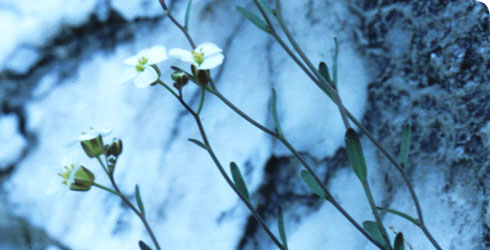Arabidopsis lyrata (northern rock cress)
Arabidopsis lyrata northern rock cress is a weedy herb of rocky places.
Arabidopsis lyrata's extensive variation in
- leaf-shape
- flowering time
- reproductive mode
- rock-type
- altitudinal range
has attracted attention for studying ecological genetics and local adaptation (Mitchell-Olds 2006; Sandring et al., 2009). Consequently, this rather simple plant is used in science as a model.
Model plants are scientifically valuable for studying biological processes. Model plants are often related to crop species, but can be cultured in the laboratory or greenhouse, functioning as simple systems for studying the genetic basis of morphological, biochemical, physiological variation. Now researchers have applied these tools to study natural variation in wild relatives.
Species detail
-

Taxonomy
Learn more about Arabidopsis lyrata and its subspecies and discover where you can get a detailed taxonomic account of the species.
-

Distribution and ice-ages
Discover the areas that Arabidopsis lyrata is known from and how its range coincides with the last ice-age.
-

Life history and morphology
Find out about the ability of Arabidopsis lyrata to grow in disturbed habitats and read about its reproductive patterns and life cycle.
-

Research topics
There are a range of research topics covered by staff and the Natural History Museum relating to Arabidopsis lyrata. Get an overview of current and recent research topics.
-

Conservation
Read about the small areas to which this species is often restricted across its range.
-

References
Get reference material for Arabidopsis lyrata.
About the author

Dr Stephen Ansell
Post-Doctoral Research Assistant focussing on plant population genetics in the Life Sciences department.
